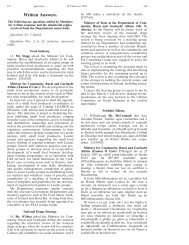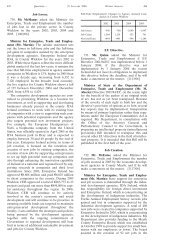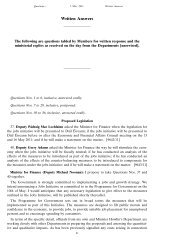Written Answers. - Parliamentary Debates - Houses of the Oireachtas
Written Answers. - Parliamentary Debates - Houses of the Oireachtas
Written Answers. - Parliamentary Debates - Houses of the Oireachtas
You also want an ePaper? Increase the reach of your titles
YUMPU automatically turns print PDFs into web optimized ePapers that Google loves.
Questions— 14 February 2012. <strong>Written</strong> <strong>Answers</strong><br />
Tax Code<br />
135. Deputy Clare Daly asked <strong>the</strong> Minister for Finance if it is <strong>the</strong> case that <strong>the</strong> total VAT<br />
currently being charged on ESB bills is being charged on <strong>the</strong> total bill including <strong>the</strong> carbon tax<br />
and if this is so <strong>the</strong> basis for same. [8184/12]<br />
Minister for Finance (Deputy Michael Noonan): I would point out initially that <strong>the</strong> carbon<br />
tax does not apply to electricity and as such ESB bills do not include a carbon tax element, to<br />
which VAT would apply. The amount on which VAT is chargeable, in accordance with section<br />
37(1) <strong>of</strong> <strong>the</strong> Value-Added Tax Consolidation Act 2010, is <strong>the</strong> total consideration receivable by<br />
<strong>the</strong> supplier, “including all taxes, commissions, costs and charges whatsoever” but not including<br />
<strong>the</strong> VAT itself.<br />
VAT is governed by <strong>the</strong> EU VAT Directive, with which Irish VAT law must comply. Article<br />
78 <strong>of</strong> <strong>the</strong> VAT Directive provides that <strong>the</strong> taxable amount shall include “taxes, duties, levies<br />
and charges, excluding <strong>the</strong> VAT itself”.<br />
In this respect, where a supply <strong>of</strong> service, such as a gas bill, includes carbon tax, VAT law<br />
dictates that VAT should be calculated on <strong>the</strong> carbon tax element <strong>of</strong> <strong>the</strong> charge as well as <strong>the</strong><br />
charge for <strong>the</strong> service. The same situation applies in <strong>the</strong> case <strong>of</strong> o<strong>the</strong>r excises, including for<br />
example excises on petrol, auto-diesel, tobacco and alcohol products.<br />
Guidance in relation to <strong>the</strong> VAT treatment <strong>of</strong> <strong>the</strong> total consideration receivable by a supplier<br />
is set out in <strong>the</strong> VAT Guide. This publication is available on <strong>the</strong> Revenue website at<br />
www.revenue.ie.<br />
International Agreements<br />
136. Deputy Pearse Doherty asked <strong>the</strong> Minister for Finance if <strong>the</strong> ratification <strong>of</strong> <strong>the</strong> European<br />
Stability Mechanism Treaty will take place before or after <strong>the</strong> passing <strong>of</strong> <strong>the</strong> European<br />
Stability Mechanism Bill; and if he will make a statement on <strong>the</strong> matter. [8229/12]<br />
Minister for Finance (Deputy Michael Noonan): The ESM treaty was signed by Euro Area<br />
Member States on 2 February 2012. The original version <strong>of</strong> <strong>the</strong> treaty was signed on 11 July<br />
2011, but it has been modified to incorporate decisions taken by <strong>the</strong> Heads <strong>of</strong> State and<br />
Government (HoSG) <strong>of</strong> <strong>the</strong> Euro Area on 21 July and 9 December 2011, aimed at improving<br />
<strong>the</strong> effectiveness <strong>of</strong> <strong>the</strong> mechanism. The treaty will have to be ratified by <strong>the</strong> 17 Euro Area<br />
Member States. The ESM treaty will enter into force as soon as Member States representing<br />
90% <strong>of</strong> <strong>the</strong> capital commitments have ratified it. The ESM will become operational as soon as<br />
possible. A target date <strong>of</strong> July 2012 has been set, which is a year earlier than originally planned.<br />
As a permanent mechanism, <strong>the</strong> ESM will take over <strong>the</strong> tasks currently fulfilled by <strong>the</strong> European<br />
Financial Stability Facility (EFSF) and <strong>the</strong> European Financial Stabilisation Mechanism<br />
(EFSM). With <strong>the</strong> accelerated entry into force, <strong>the</strong> ESM will now operate alongside <strong>the</strong> EFSF<br />
for 12 months.<br />
Primary legislation will be required to enable Ireland to ratify <strong>the</strong> ESM Treaty and<br />
implement its provisions. It is expected that <strong>the</strong> required legislation will be published this term.<br />
Ireland cannot ratify <strong>the</strong> ESM Treaty until <strong>the</strong> required legislation is enacted.<br />
Tax Code<br />
137. Deputy Thomas P. Broughan asked <strong>the</strong> Minister for Finance fur<strong>the</strong>r to <strong>Parliamentary</strong><br />
Question No. 84 <strong>of</strong> 8 February 2012, in terms <strong>of</strong> State and semi-State commercial companies<br />
employing contractors, if Revenue has carried out an investigation into whe<strong>the</strong>r so-called contractors<br />
are in fact employees and <strong>the</strong> purpose <strong>of</strong> <strong>the</strong> contractor status is to minimise personal<br />
363











![[Deputy Michael Noonan.]](https://img.yumpu.com/30494839/1/190x245/deputy-michael-noonan.jpg?quality=85)




